Zeinab Masri|Jana al-Issa
Until 2010, Syria hosted four major conventional industrial cities, namely: Adra in the countryside of Damascus, northeast of the capital, Shaykh Najjar in the city of Aleppo, Hisyah, south of Homs, and the industrial city of Deir Ezzor.
Syria’s industry has been hit hard by the last ten years of war. Significant parts of the industrial cities have suffered severe destruction that affected the reality of the industry.
With the military and political changes in the Syrian geography, yet, the above-mentioned industrial cities remained within the influence of the Syrian regime, leaving the areas under the influence of the opposition in northern Syria without industrial zones and cities.
Since the opposition factions took control of Aleppo’s northern and northwestern countryside with Turkish support in 2017, Turkey has worked to administrate social and economic services in northwestern Syria. Turkey also helped local authorities with the creation of industrial sites to stimulate economic development in the region.
Industrialization–industrial cities and zones–has always been instrumental in economically stable countries; it contributes to diversifying the sources of national income, eliminating domestic migration, increasing economic growth, and providing the people of the region with numerous job opportunities.
In this in-depth article, Enab Baladi brings the issue of industrial cities in the northern countryside of Aleppo to light and outlines the most predominant obstacles encountering the industrialists in the region. It also discusses with economic experts the reality of the industry, identifying the need for industrial zones and cities in the region, and the reasons behind supporting these zones by Turkey.
Five sites conducting industrial activities in Aleppo countryside
Five industrial cities are under construction in the northern countryside of Aleppo, namely: Azaz, al-Rai, Jarabulus, al-Bab, and Marea.
Azaz’s industrial zone is located in the city of Azaz, northwest of Aleppo, and it includes large manufacturing areas. The second industrial city is al-Rai, northeast of Aleppo, and it has a lot of craft shops. The third industrial city is under construction in the city of Jarabulus, northeast of Aleppo, and it most often includes a wide variety of crafts.
There is a “special” area in the city of al-Bab in the eastern countryside of Aleppo owned by a businessman. This businessman obtained a license to organize it as an industrial zone that includes spaces available for the manufacture of industrial products and the provision of services from industrial manufacture. The last city was newly established in Marea, north of Aleppo. All its shares were sold, said the Minister of Economy in the Syrian Interim Government (SIG), Dr. Abdul Hakim al-Masri.
Al-Bab Industrial zone
In 2018, Omar Waki, a Syrian businessman, established an organized industrial zone in the city of al-Bab, in the eastern countryside of Aleppo, after obtaining permission from al-Bab City Local Council. This city includes 15 stand-alone industrial facilities, employing 500 persons. Remarkably, the production outputs vary from one factory to another; some factories are more productive than others in order to cover the needs of the local markets.
Waki pointed out that the industrial facilities import their raw materials from Turkey, Syria’s local markets, or various countries—he did not mention a certain country. The goods are distributed out to the relevant wholesalers and retail stores only within the country, except for small quantities that go to Turkey.
The transit trade to Turkey is activated; anyone can export his products. Unfortunately, the industrialists’ communication with the outside world is too limited, not to mention that their capabilities are “weak.”
The industrialist can purchase a site-engineered plot for industrial development, production facilities, or the construction of warehouses. This is formalized with the registration of title to the respective land in the local council.
Industrial zone in al-Rai
The local authorities started building an industrial zone in the city of al-Rai. Hussein al-Issa, head of al-Rai’s Chamber of Commerce and Industry, said in press statements last February that the number of establishments of relatively small areas in the industrial zoen is 800.
Yeni Şafak, a Turkish newspaper, said in a statement issued in October 2019 that the al-Rai industrial zone covers almost 15,000 hectares. The newspaper also reported in September 2020 that the shoe industry was concentrated in this zone, noting that al-Rai’s footwear products are exported to the world.
The Turkish Ministry of Trade allowed only the Çobanbey Customs Directorate in the Kilis border state with Syria to import shoes from Syria as of 1 December 2020.
Jarabulus’s industrial city
The local council of Jarabulus, northeast of Aleppo, is working to build an industrial city south of Jarabulus city on the road to its automated bakery. The industrial city will include experts, craftsmen and small workshops.
The industrial city has around 200 stores, which are distributed within two blocks. Stores sold in the industrial city accounted for 50 percent.
The city’s 200 stores are divided into three blocks. The percentage of shops sold in these blocks accounted for 50 on an area of 20 dunams, according to statements by the head of the Chamber of Commerce and Industry, Tariq Deda, on the local council’s Facebook page.
Al-Marea’s industrial zone
In 2018, the local council of Marea launched a project to build an industrial zone north of the city, consisting of two building blocks, including 32 stores.
Industrial zone in Azaz
Azaz city’s local council, northwest of Aleppo, began last July to establish an industrial zone, east of the city, on an area of 85,000 square meters divided into industrial-purpose land plots after announcing the start of preparing the area in August 2020.
Industrialists interested in investing in Azaz city’s industrial zone will have several special advantages, mainly the low costs of raw materials and manufacturing relative to neighbouring countries. In addition, industrialists’ travel journeys to Turkey necessary for following up production processes will be facilitated upon entry and exit.
On 3 October, the local council and the Chamber of Industry and Commerce in the city of Souran announced their need to purchase land of no less than three hectares in the Souran area exclusively to establish an industrial city.
What does an industrial area provide?
The above-mentioned industrial zones and cities will include facilities and factories, effective, shared services and utilities, safety and security, and a positive, attractive environment for industrialists.
The roads will be paved. Industrial zones and cities will be well organized to include public utilities, such as car washes and mosques, Abdul Hakim al-Masri told Enab Baladi.
The minister said that PTT’s ATM will be installed in al-Rai’s industrial zone. Industrial zones will be supplied with water via wells. They will also have an independent electricity distribution network so that residential areas will not be affected.
As for transportation, the industrial zones and cities have access to many transportation modes; vehicles are available, and roads are somewhat goods. Safety and security services will be provided soon in these zones, the minister said.
Al-Masri indicated that the business people and industrialists are not encouraged to invest in northern Syria’s industrial zones and cities. They have “legitimate” fears for investing in this region. Therefore, al-Masri called on the business owners to invest in small businesses until industrial zones and cities stabilize and expand.
The minister attributed the investors’ concerns to the lack of a stable security situation in the region and marketing; some industries are marketed only within the country. Other products are exported to Turkey, the Gulf states, and some European countries.
Regarding the industries available in northwestern Syria’s industrial zones and cities, the minister pointed out that the major industries spread in the industrial zones of the northern countryside of Aleppo include: shoes, oil seeds crushing, pyrene (olive press residues used for heating), soap, sanitary plastic pipes, tissue paper, canned foods such as pepper, tomatoes, and pickles, dairy products.
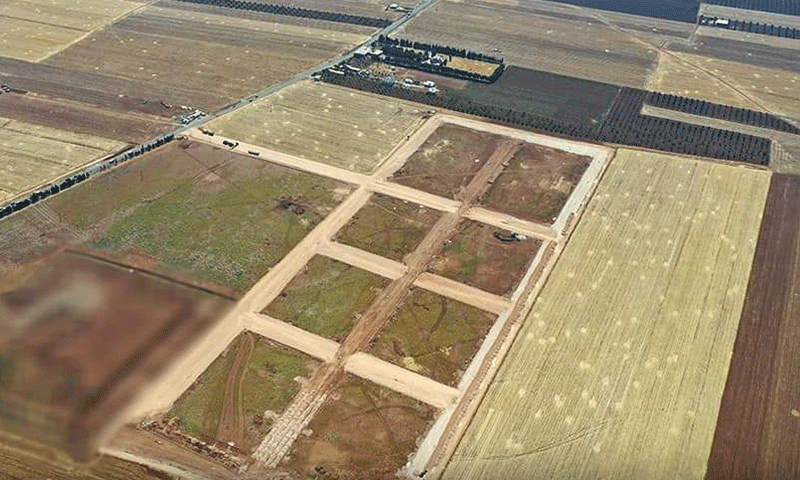
An aerial image showing streets being prepared in the industrial zone to the east of Azaz city in Aleppo’s northwestern countryside – 4 July 2021 (Azaz local council)
Challenges faced by industrialists with “simple” capabilities
Many industrialists and business economists expected, after laying the foundation stone of the first industrial zone in the city of al-Bab, north of Aleppo in February 2018, that this zone will organize the work of industrialists in the region and attract investors to improve the economy.
Unfortunately, just over three years after the foundation stone was laid, the expectations they raised have yet to be met. Maybe, this needs a longer time, or maybe more funds, or even changes in the plans of the industrial zone management to achieve the objectives of al-Bab’s industrial zone, represented in raising the economy of the entire region and supporting investments.
Investors in the industrial zone of al-Bab face several problems, most prominently the high electricity prices, limited access for customers to their products and services, Muhammad Othman, a member of the media office in the local council.
Othman told Enab Baladi that solutions must be found for these two main problems. When industrialists operate at lower production costs, this would consequently reduce the prices of their consumer products and services. In addition, other investors will be motivated to join the industrial zone if it is provided with roads and transportation to facilitate the movement of goods across the region, without any restrictions.
According to Othman, the industrial reality in the city is “bad” at present” because industrialists encounter obstacles when merchandising the goods produced in their factories.
Poor services that do not yield their expected results
Mustafa al-Qashqosh, the drinking water bottling factory owner in the industrial zone of al-Bab, supported Muhammad Othman’s view about the most prominent problems faced by factory owners inside the city.
Al-Qashqosh said that the privileges he benefits from as a factory owner are limited to guarding the industrial facilities at the entry point of the industrial zone and getting a “private travel permit” to Turkey.
| The local council’s trade office grants traders or manufacturers in order to be able to fill out a form for entry into and exit from Turkey, a trade or industrial record based on the customs data proving their constant business activities or the validity of their company’s licence. They should also have only a valid passport, an identification card issued by the local council, the Turkish Postal Corporation’s (PTT) bank account, a real estate registration statement or rental contract, financial clearance, and a biometric ID photo. |
Many industrialists and investors would like to enjoy the benefits of the security services proliferated at the entry points of the industrial zones and cities in order to protect their businesses in light of the security chaos and frequent explosions in northwestern Syria.
Al-Qashqosh said that the industrialists suffer from a lack of basic infrastructure services inside the zone, such as high electricity fees, insufficient quantities of water, lack of street lights, and sewage services.
As a result of the high electricity prices, some factories started to operate only three or four days a week, Enab Baladi observed.
The local council of al-Bab city considers al-Bab’s industrial zone as “the largest industrial cluster,” in the region since announcing its establishment in 2018. The council indicated that al-Bab’s industrial zone would be one of “the most important economic projects,” that would help enhance the individual’s level.
However, three years after the announcement, when Enab Baladi asked Muhammad Othman, a member in the media office of al-Bab’s local council, about the privileges that industrialists obtain in the industrial zone, his response was limited to a change in the electricity costs for operating the facility inside and outside the city only.
Royalties hinder distribution
Factories of al-Bab’s industrial zone get most of their raw materials in general from Turkey. They also get various raw materials in limited quantities from northwestern Syria’s local markets, Muhammad Othman said.
Most of their products are sold out in the city of al-Bab, and part of it goes in northwestern Syria. Only small quantities are exported to Turkey, areas in northeastern Syria, and areas controlled by the Syrian regime.
Factories can sell out their products if their owners have strong trade relationships with several customers or if they have robust financial capabilities. This is because several royalties must be paid by the trucks loaded with goods to the checkpoints placed along the main roads, said Mustafa al-Qashqosh, the owner of the drinking water bottling factory in the industrial zone of al-Bab.
Al-Qashqosh said that selling products only a few kilometres away from the city of al-Bab costs the industrialists a lot of money because most checkpoints set up across the country claim to be “customs checkpoints.” Still, in fact, they are placed for “robbing people.”
This is why most factory owners in al-Bab intend to sell their products only within their city boundaries. They prefer to meet the needs of their customers in the region over their expectation to make additional profits.
Crossing points leading to income loss
For the same reasons, the owner of the rubber mat factory in the industrial zone of al-Bab, Abdul Khaleq Tahbash, is forced to run his factory only ten days per month.
Tahbash told Enab Baladi that the profit his factory used to make was much better;90 percent of its production was confined to regime-held areas and areas in northwestern Syria. The remaining portion of the products was used to cover the needs of people in northwestern Syria.
However, this did not last long because the Abu al-Zandin crossing connecting the opposition-controlled areas with the regime-controlled areas was closed. Consequently, this has prevented the passage of goods.
The imposition of “very high” royalties by the various security authorities controlling the road of trucks delivering goods to northeastern Syria led Tahbash to decide not to distribute his goods except in northwestern Syria.
Tahbash said that what reinforced his decision not to deliver goods to northeastern Syria is that the various controlling parties on the roads demanded the transfer of goods from one truck to another, which led in many cases to the loss of or damage of his factory products (rubber mats).
| The local council’s trade office grants traders or manufacturers in order to be able to fill out a form for entry into and exit from Turkey, a trade or industrial record based on the customs data proving their constant business activities or the validity of their company’s licence. They should also have only a valid passport, an identification card issued by the local council, the Turkish Postal Corporation’s (PTT) bank account, a real estate registration statement or rental contract, financial clearance, and a biometric ID photo. |
“Attractive and encouraging” advertisement
An industrial city will be built in the northern city of Azaz, on an area of 85,000 square meters. The industrial zone will be divided into plots designed for the establishment of workshops and factories, according to what was announced by the local council in the city last July.
In an interview with Enab Baladi, the media office of the local council of Azaz explained that work is currently underway to be equipped with utilities and transport infrastructure, including water, electricity, roads, complete infrastructure, and the services that the area needs.
Zakaria Hamsho, the owner of a clothing manufacturing workshop in the city of Azaz and a former factory owner in Aleppo, believes that Azaz needs industrial zones more than the neighbouring areas as a priority to solve the most prominent problems of the industrialists.
Hamsho said that the industrialists face many challenges; they cannot easily secure a sustainable supply of raw materials necessary for production. They also suffer the repercussions of the instability of the Turkish lira, and low-cost labour and lack of markets for their products.
Zakaria Hamsho believes that industrial zones can achieve success mainly if competent and experienced officials in commercial and industrial businesses are appointed to overcome the “obstacles” that they will certainly face. In addition, the industrial zone has to be provided with basic services such as electricity, water, utilities and transportation infrastructure that facilitate the transportation of goods without encountering any restrictions.
‘Discouraging’ initial costs
Zakaria Hamsho told Enab Baladi that under the current circumstances, he will not be able to move to the industrial zone when it is fully prepared.
During a seminar to agree on land allotments as an initial step for the establishment of an industrial zone in Azaz—attended by Zakaria Hamsho—it was found that the cost of acquiring a specific plot within the industrial zone is “very high.”
Hamsho said that he does not want to purchase a plot within the industrial zone of Azaz because of its high price; the value of a 600-meter plot of land in the industrial zone of Azaz is double the value of a plot sited outside the industrial zone. Moreover, the latter could result in increased productivity and be a better place to work.
Hamsho also suggests that the industrialists should be granted financial credit and loans to improve their situation and help them sell more products and services. Thus, they can take steps to develop their businesses in the industrial sector.
For his part, Ibrahim Derbala, director of the commercial office of the Azaz local council, explained that the goal of establishing an industrial zone in the city is to develop the area economically, work to reduce unemployment rates as much as possible, ensure job opportunities and strive to make Syrian people productive as used to be before the Syrian crisis.
Derbala told Enab Baladi that the main difficulty encountered by industrialists in Aleppo countryside included the lack of recognition by some countries of the certificate of origin granted by the Chambers of Commerce and Industry in northern Syria, which hinders the export of goods while production continues.
He said that the Azaz Chamber of Commerce provides services and facilities to traders and industrialists in the region, such as facilitating the movement of their entry and exit to and from Turkey and granting them a certificate of origin and industrial property that protects their products from theft and counterfeit. Besides, the Azaz Chamber of Commerce cooperates with the security authorities to create a safe environment that allows them to carry out their work comfortably and safely.
How does Turkey benefit from supporting industry of northern Syria?
Usually, organized industrial zones and cities established in the border areas with neighbouring countries can create advantages for investors and residents of these areas alike.
Industrial zone projects’ primary benefits include revitalizing trade at the border-crossing points, making progress in economic development and social services, and creating more job opportunities. Moreover, this geographic proximity to the Syrian-Turkish border enhances the importing and exporting activities, thereby reducing manufacturing and production costs.
Northern Syria would have been suffocated economically if it had not had land borders with Turkey, as cities and towns in northern Syria adjacent to Turkey are considered as a “lifeline,” regardless of the presence of industrial zones, said economics researcher Dr. Firas Shabo.
Northern Syria is linked with Turkey via seven border crossings: Bab al-Hawa in Idlib, Olive Branch, Bab al-Salam, al-Rai, and Jarabulus in the northern countryside of Aleppo, Tell Abyad, north of Raqqa, and Ras al-Ain, north of al-Hasakah.
Syrian opposition factions have controlled the northern and northwestern countryside of Aleppo since 2017, with Turkish support. Since then, Turkey has extended its economic influence with its military and political control. As a result of military changes, northern Syria has been divided into military and economic influence.
The Turkish authorities manage the economy of the northern and northwestern countryside of Aleppo through local councils.
Turkey has contributed to establishing local councils and funded them by providing them with services and facilitating investments in their productive activities. In addition, they supported traders and industrialists, introduced the Turkish lira in northwestern Syria, and provided local councils with financial institutions.
In a previous in-depth article titled, “Turkey is shaping northern Syria’s economy—but who is benefitting?”, Enab Baladi brings to focus Turkey’s economic contributions into the areas in northern Syria, also discussing the profits both sides are making.
Based on the significant presence of industrial zones in Turkey, the Turkish authorities have thought that establishing industrial zones and cities in northern Syria contributes somewhat to revitalizing the economic situation. However, this requires a stable security situation in the first place. Second, critical infrastructure services such as energy, transportation and water utilities are essential factors for building industrial zones or cities. Third, industrialists and traders need raw materials and access to export their products. Turkey is working to meet all the above-mentioned requirements to establish industrial zones in northern Syria, Shabo told Enab Baladi.
Efforts to reduce the flow of refugees to Turkey
The researcher elaborated that Turkey’s goal of the facilities it grants to traders and industrialists is to revitalize northern Syria’s economy and create an economic environment that enables the population to work in order to prevent migration to its lands.
Northern Syria as market for Turkey’s raw materials and products
Turkey also benefits from the presence of industrial cities and zones in northern Syria by exporting raw materials used in production. That is, northern Syria is a market for Turkey’s raw materials and products.
Industrial zones and cities supporting Turkish Industry
Industrial zones and cities established in northern Syria support the Turkish industry. Some products, such as shoes, are manufactured in northern Syria at a low cost —including low-paid labour. Then, these products are marketed and exported abroad as Turkish ones. Thus, according to the researcher, Turkey benefits from wage and price differences and supplies its treasury with foreign exchange.
The circular issued by the Turkish Ministry of Trade No. 21/2021 and updated on 24 August reveals the lists of goods and materials—are imported from northern Syria or exported to it or passed through Turkey during their transfer to other countries— that are granted “certificates of origin,” in addition to lists of goods that cannot be awarded these certificates.
According to the circular, the materials imported from Syria that are granted a certificate of origin by the Turkish Customs Services are shoes, the caper bush, machines and their parts, watermelon seeds, cotton seeds, dried corn, waste paper, ferrous metals used in the iron and steel industry, anise, barley, almonds, beans, wheat, cumin, bay leaves, cherries, coriander, Prunus mahaleb, chickpeas, cotton, rice, garlic, and sesame.
The Turkish authorities do not grant certificates of origin to Syrian products transited through Turkey for export, which are: metal scrap, liquefied petroleum gas and industrial gas cylinders, sunflower seeds, lentils, olives, olive oil, barley, wheat, cigarettes, electronic hookah, classic hookah, tobacco, alcoholic beverages and all kinds of machinery and equipment.
Speaking to Enab Baladi, the SIG’s Economic Minister Abdul Hakim al-Masri explained to Enab Baladi that there is no international legal recognition of the Syrian opposition’s establishments and their products, thereby their certificates of origin.
Therefore, the Turkish government grants a Turkish certificate of origin for goods produced in northern Syria and will be exported to other countries via passing through Turkey. However, the goods shipped to Turkey do not need customs facilities because the Turkish authorities recognize the opposition institutions.
According to the minister, Turkey imports from northern Syria potatoes, onions, dried figs, peaches, plums, beans, pistachios, metal ladders, clothing, shoes, laurel soap, Syrian stone, olive oil, and laurel oil.
Encouraging refugees to return to Syria
Northern Syria is linked to the Turkish economy as a result of the political reality in the region. Therefore, establishing an actual economy in northern Syria brings Turkey several benefits. The most important is to improve the reality of economic indications in support of projects that encourage the return of Syrian refugees to their country, said political economy researcher Yahya al-Sayed Omar.
The researcher emphasized that the repatriation of refugees cannot be discussed in light of a collapsing economy.
The Turkish authorities seek to provide the areas under the control of the SIG with various services. Simultaneously, they are promoting the “voluntary” return of Syrian refugees to these areas.
On 12 October, the Turkish authorities said that it helped around 446,382 Syrians voluntarily return to their country. This came after a statement issued by the Turkish Foreign Ministry on 12 September. The statement said Turkey was cooperating with the United Nations and the international community to secure the safe return of Syrian refugees.
Pressure relief
Turkey also benefits from industrial zones and cities in northern Syria via transiting northern Syria from a consumer to a producer, political economy researcher Yahya al-Sayed Omar told Enab Baladi. This is because if northern Syria remains consuming, this will increase pressure on the economy of Turkey.
Industrial cities and zones are the backbones of any economy; they enhance productivity and economic growth. Their importance appears in the light of the growing service economy, which is considered to have high risks compared to the productive economy.
ٍSupporting reconstruction
The presence of industrial zones and cities in northern Syria supports the infrastructure needed for comprehensive reconstruction in the future. According to Omar, Turkey undoubtedly has a share in this process, given its political weight in the Syrian issue.
The establishment of industrial zones also supports the Turkish efforts, especially when the reconstruction begins, and this can be referred to as one of its long-term goals.
Supporting political and security stability
Researcher Omar explained that these industrial zones would strengthen political stability in the region, and it is impossible to separate political and security stability from economic stability. Undoubtedly, the political stability in northern Syria supports Turkey’s position regionally and internationally regarding the Syrian issue.
Industrial zones and cities need the Turkish market, as the Turkish economy is the actual outlet for the economy of northern Syria. All the sources of energy come from Turkish lands, and in addition, some production requirements and raw materials are imported from and through Turkey. All in all, Turkey has a significant role in the success and support of these industrial zones.
if you think the article contain wrong information or you have additional details Send Correction
النسخة العربية من المقال
-
Follow us :












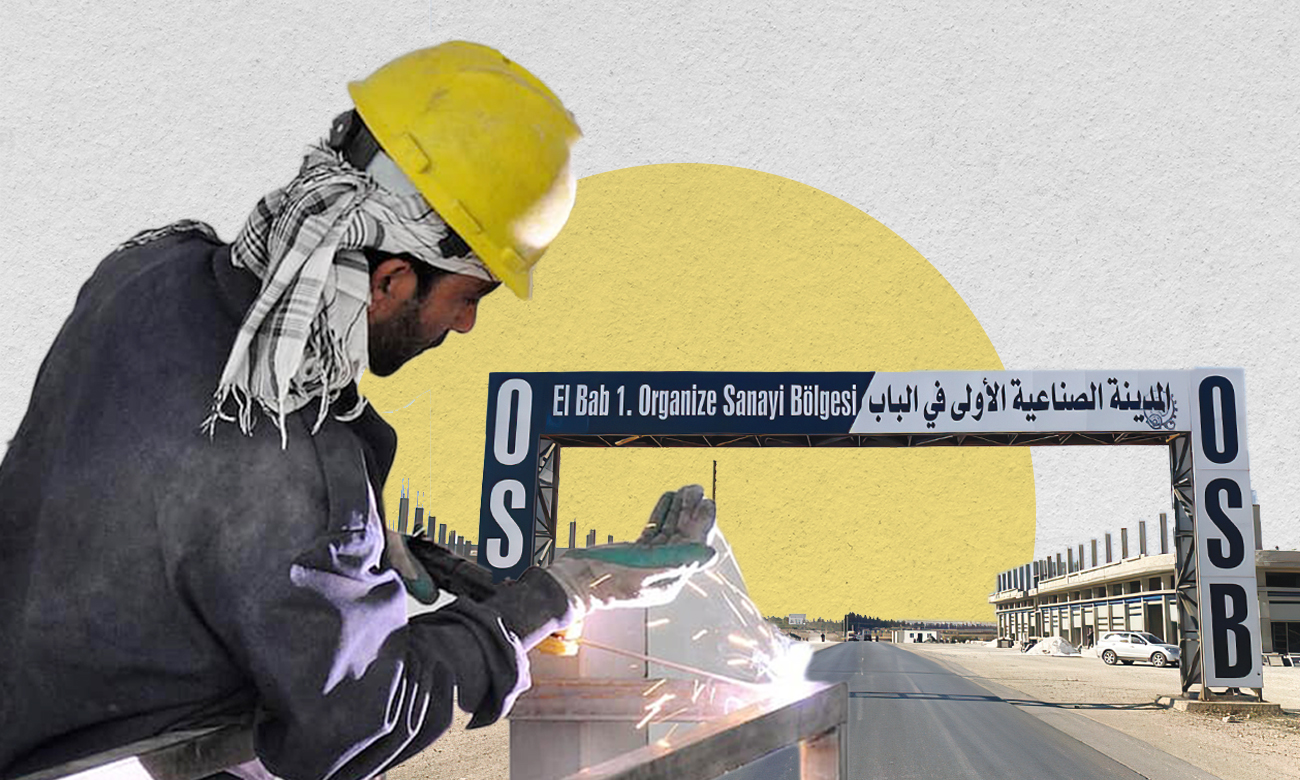
 The industrial city of al-Bab (Edited by Enab Baladi)
The industrial city of al-Bab (Edited by Enab Baladi)





 A
A
A
A
A
A



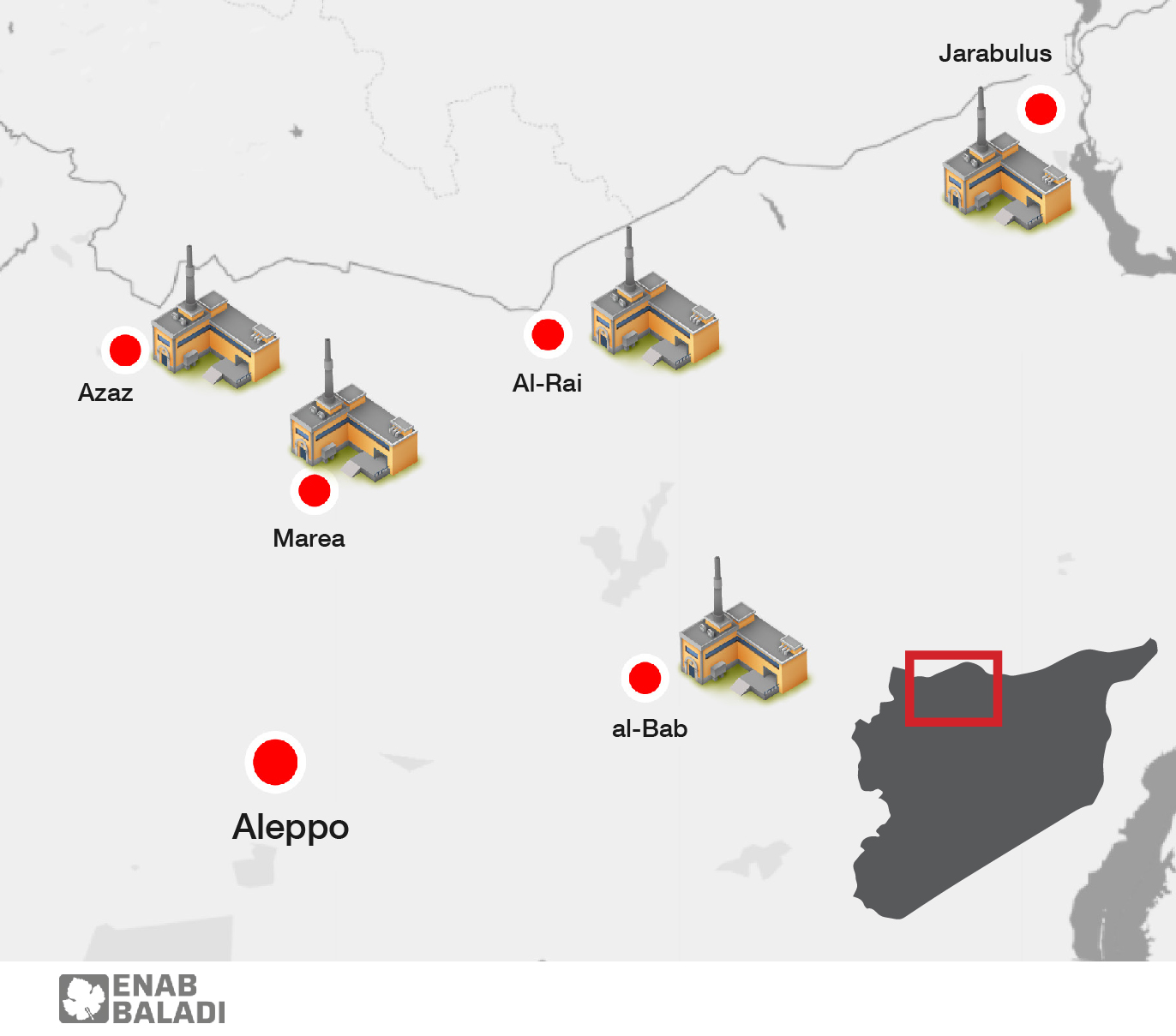
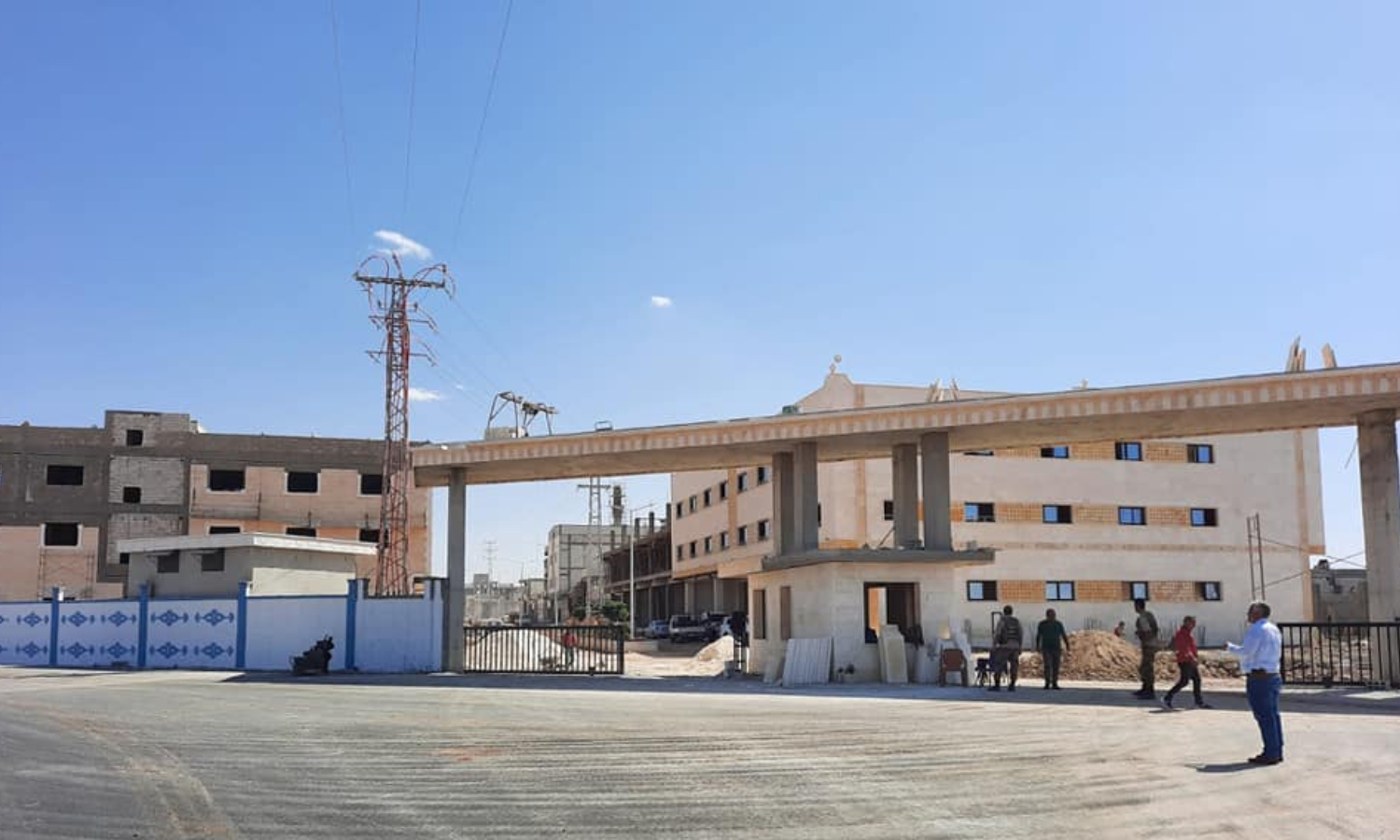


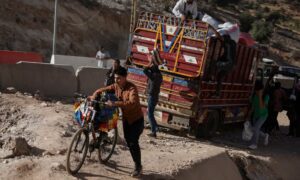
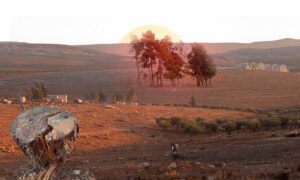
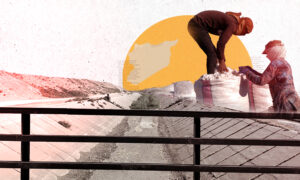
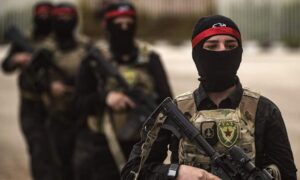
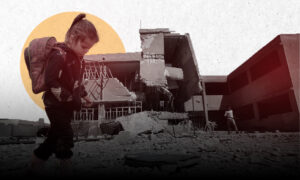
 More In-Depth
More In-Depth